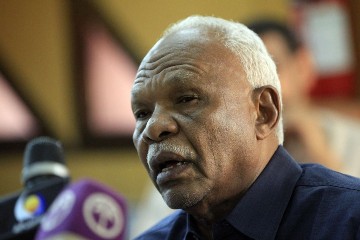Sudan has no intention of reversing oil shutdown decision, minister says
July 23, 2013, (KHARTOUM) – Sudan’s oil minister, Awad Ahmed al-Jaz, has reiterated that Khartoum will stick to its decision of stopping the flow of South Sudan’s oil through its territory following the end of the 60 day deadline.

Juba responded by reducing its oil output to 160,000 barrels per day from 200,000 barrels a day.
On Tuesday South Sudan’s oil minister Stephen Dhieu Dau said that his country will complete the shutdown of its oil production by next week.
Dau said Juba implored upon its northern neighbor not to follow through on its threat and warned that the pipelines risk being damaged for good thus posing a loss to Khartoum and other investors.
The Sudanese oil minister said during a meeting today with a high level delegations from the Chinese National Petroleum Company (CNPC) and the Malaysian Petroleum Nasional Berhad (PETRONAS) that the “ball is in the court of South Sudan”.
Al-Jaz said that South Sudan could avoid stoppage of oil flow by fully implementing the cooperation agreements matrix and proposals of the African Union mediator Thabo Mbeki agreed upon by the two countries.
In September of last year, both Sudan and South Sudan signed a series of cooperation agreements, which covered oil, citizenship rights, security issues, banking, border trade among others.
Last March, the two countries signed an implementation matrix for these cooperation agreements.
But last June, the Sudanese president Omer Hassan al-Bashir ordered the closure of all pipelines carrying oil from South Sudan. He said that the move was in response to South Sudan’s funding of rebels fighting his government.
Al-Jaz recalled to the efforts made by Sudan to arrive at a lasting peace with South Sudan, saying that security is crucial element for oil transfer from production areas to global markets.
He stressed that his ministry was able to maintain the oil installations when South Sudan shut its production, expressing his ministry’s readiness to provide technical assistance for South Sudan.
The Sudanese official said that his government is keen on the future of the oil industry in Sudan and called upon partners for further cooperation in order to increase oil production, pointing to the growing demand for energy locally and globally.
Representatives of CNPC and PETRONAS, for their part, expressed hope that Sudan and South Sudan work together to arrive at a solution which helps overcome the problem for the benefit of the two countries.
Khartoum says the rebel groups of Darfur, Blue Nile and Nuba Mountains are harboured and supported by the South Sudanese government. In return, Juba points out that the ongoing rebellion led by David Yau Yau in Jonglei is backed by the Sudanese authorities.
The African Union (AU) panel recently made a series of proposals aiming to ensure the effective implementation of the security arrangements and dispatched a team of experts to determine the centreline of the demilitarised border zone between the two countries.
The AU Ad Hoc Investigative Mechanism (AIM), which is comprised of three senior military officers, was scheduled to arrive today in Khartoum and head later to Juba.
It is tasked with probing accusations made by Sudan and South Sudan of support to each other’s rebel groups.
(ST)
